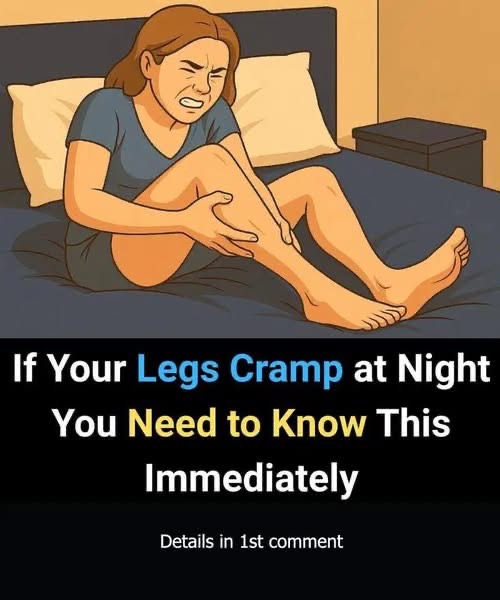Night Leg Cramps: Debunking the Spiritual Meaning Myth and Understanding the Real Causes

1. The Myth: Spiritual or Supernatural Significance
There’s been a viral claim suggesting that waking from night leg cramps reflects a “spiritual message” or even serves as a warning—some even sensationally connect it to “amputations.” This notion is completely unfounded. Medical evidence shows these cramps occur due to physiological factors, not spiritual ones.
2. What Actually Causes Night Leg Cramps?
a) Involuntary Muscle Contractions
Night leg cramps (nocturnal leg cramps) are sudden, painful involuntary contractions—often in the calf muscles—that occur during rest or sleep ([Healthline][1], [Wikipedia][2]). These intense spasms may last seconds to minutes and can leave residual soreness ([Healthline][1], [Cleveland Clinic][3], [MedicalNewsToday][4]).
b) Common Patterns
- Idiopathic origin: In most cases, especially in otherwise healthy individuals, the exact trigger is unknown ([Healthline][1], [Wikipedia][2]).
- Sleep-related mechanics: Lying with feet pointed downward (plantar flexion) shortens calf muscles, making them prone to cramping ([Healthline][1]).
- Muscle fatigue and poor circulation: After a long day, tired or strained muscles are more vulnerable. Reduced blood flow or prolonged sitting/standing can further increase risk ([Prevention][5], [MedicalNewsToday][4], [Circle Health Group][6]).
- Age, pregnancy, and lifestyle: Cramping is more prevalent among older adults, pregnant individuals, and those leading sedentary lifestyles ([Healthline][1], [Cleveland Clinic][3], [Prevention][5], [MedicalNewsToday][4]).
c) Underlying Medical Causes (Secondary Cramps)
While most cramps are benign, persistent or severe episodes may indicate serious health issues, such as:
- Circulatory problems: Peripheral artery disease, poor blood flow
- Nerve damage: Diabetic neuropathy, neurological disorders
- Metabolic or systemic diseases: Kidney disease, thyroid disorders, liver conditions, diabetes, electrolyte imbalances (e.g., calcium, potassium, magnesium) ([Mayo Clinic][7], [WebMD][8], [MedicalNewsToday][4], [Verywell Health][9], [Prevention][5], [Cleveland Clinic][3]).
- Medication side effects: Diuretics, asthma medications, statins, hormone therapies, and certain pain relievers ([Mayo Clinic][7], [MedicalNewsToday][4], [Prevention][5], [Cleveland Clinic][3]).
d) Why You Wake Up Screaming—or Nearly So
It’s painfully intense because:
- The cramp jolts you out of deep sleep with sudden, sharp pain.
- The muscle feels rigid, often described as “locked” or “paralyzed.”
- The shock of pain can feel disproportionately violent compared to the actual muscle spasm ([Healthline][1], [Cleveland Clinic][3], [WebMD][8]).
3. What to Do When a Cramp Strikes
Immediate Relief
- Stretch: Straighten the leg and pull your toes toward your shin (dorsiflexion) ([Healthline][1], [Cleveland Clinic][3], [WebMD][8]).
- Massage: Gently knead the tight muscle with your hands ([Healthline][1], [Cleveland Clinic][3], [Sleep Foundation][10]).
- Walk on your heels: Helps relax the calf ([Healthline][1], [Sleep Foundation][10]).
- Heat or warm bath: Soothes and relaxes muscle tension ([Healthline][1], [Sleep Foundation][10]).
- Hydrate or even drink pickle juice: Some evidence suggests it may relieve cramps ([Healthline][1], [Sleep Foundation][10]).
4. Prevention Tips
| Strategy | Description |
| Stretch regularly | Especially calves and hamstrings before bed. Studies show reducing cramps from ~3 to ~1 per night after 6 weeks of stretching ([The Washington Post][11], [Healthline][1]). |
| Stay hydrated & balanced | Maintain fluid and electrolyte intake through diet (bananas, leafy greens, nuts) ([WebMD][8], [MedicalNewsToday][4], [Apollo 24|7][12]). |
| Avoid heavy bedding on feet | Loose sheets reduce plantar flexion ([Healthline][1]). |
| Light exercise before bed | Try walking, heel walking, or stationary bike to loosen muscles ([Healthline][1], [MedicalNewsToday][4], [Sleep Foundation][10]). |
| Supportive footwear & posture | Proper shoes and avoiding prolonged inactivity improve circulation ([Healthline][1], [Circle Health Group][6], [Prevention][5]). |
| Review medications | If cramps coincide with new prescriptions, consult your doctor ([Mayo Clinic][7], [Prevention][5]). |
5. When to See a Doctor
Seek medical help if:
- Cramps are severe, frequent, or waking you regularly.
- You experience muscle weakness, numbness, or persistent pain ([Mayo Clinic][13], [Cleveland Clinic][3]).
- There’s suspicion of serious underlying conditions (e.g., DVT, neurological disorders, metabolic diseases) ([WebMD][8], [MedicalNewsToday][4], [Mayo Clinic][13], [Verywell Health][9]).
- Cramp lasts unusually long (e.g., over 10 minutes) or follows exposure to toxins ([Mayo Clinic][13], [Cleveland Clinic][3]).
6. The Bottom Line
- The idea that night leg cramps carry a “spiritual warning” or lead to amputations is pure myth. There’s absolutely no medical evidence to support such a claim.
- Night leg cramps are physiological phenomena—mostly harmless but undeniably painful.
- Effective relief lies in stretching, hydrating, positioning, and managing lifestyle factors.
- Consult a healthcare provider if symptoms are recurring, intensifying, or accompanied by other concerning signs.
In summary: No, night leg cramps aren’t mystical or prophetic—they’re simply your muscles and nerves reacting to physical conditions. But with the right habits and care, they can be greatly reduced in frequency and intensity.